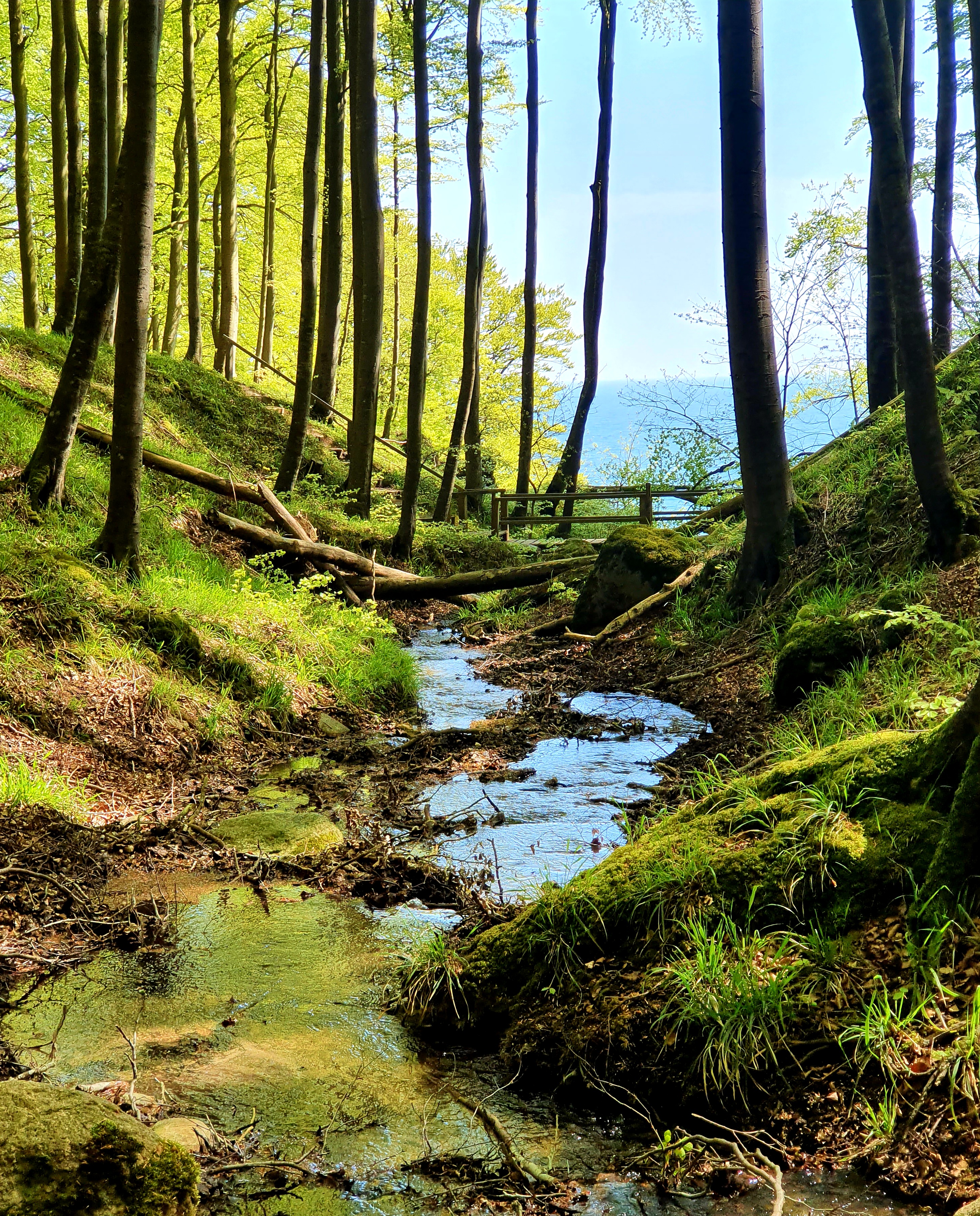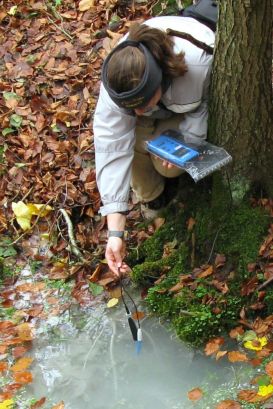
Geochemistry & Isotope Biogeochemistry Group

May 3rd, 2024:

Successfull sampling campaign on the impact of hard water creeks on the carbon system of the southern Baltic Sea ((C)Böttcher, ME).
Breaking News:
July, 2025
in spring 2025, Michael Böttcher has been elected as a corresponding member of the Mathematics and Natural Sciences Class
of the Lower Saxonian Academy of Sciences in Göttingen
June, 2025:
during the General Assembly of the European Society for Isotope Research (ESIR), Michael Böttcher was elected as Vice-President of the advisory board
May, 15th, 2025:
‘Research( .com)‘, an international academic platform for researchers, has just released the 2025 Edition of Ranking of Best Scientists in the field of Earth Sciences.
Michael E. Böttcher is ranked #77 in Germany and #1249 in the world. He is recognized with their Earth Science Leader Award for 2025.
January, 2025:
New study in nature Communications:
The role of sulfur in the mass extinction of the dinosaurs after the impact of the Chixculub asteroid 66 million years ago is likely smaller than expected.
Approximately 66 million years ago, the Chicxulub asteroid, estimated to be 10-15 kilometer in size, struck the Yucatán Peninsula (in current-day Mexico), creating a 200-kilometer-wide impact crater. This impact triggered a chain reaction of destructive events including a rapid climate change that eventually led to the extinction of the non-avian dinosaurs and around 75% of species on Earth. The main culprit is most likely the “impact winter” that followed in the years after the impact. This is thought to have been the result of a massive release of dust, soot, and sulfur, leading to extreme cold, darkness, and a collapse in global photosynthesis, with lasting effects on ecosystems for years to decades.
By reflecting sunlight reaching Earth’s surface, sulfur-bearing aerosols, produced from the vaporization of the impacted rocks, have long been considered a crucial factor in driving the cooling. However, while sulfur was assumed to play a dominant role in the climatic disruption following the impact, estimates of the amount of sulfur released have varied widely. For the first time, the total amount of sulfur released into the atmosphere due to the Chicxulub asteroid impact event has now been empirically estimated by performing detailed chemical analysis of rocks from within the impact crater in Mexico and sediments from multiple locations around the globe that record the mass extinction layer.
Katerina Rodiouchkina and colleagues have developed an innovative approach for estimating the amount of sulfur released by the impact event. The team used sulfur concentrations and isotopic compositions from new drill cores of impact rocks within the crater region together with detailed chemical profiles across Cretaceous-Paleogene (K-Pg) boundary sediments around the world. “Instead of focusing on the impact event itself, we focused on the aftermath of the impact “, explains chemist Katerina Rodiouchkina. “We first analyzed the sulfur fingerprint of the rocks within the crater region that were the source of sulfate aerosols released into the atmosphere. These sulfate aerosols distributed globally and were eventually deposited from the atmosphere back to the Earth’s surface in the months to years after impact. This deposited sulfur has created a noticeable increase in the sulfur concentration around the K-Pg boundary layer in sedimentary profiles all over the world. We used the corresponding change in the isotopic composition of sulfur to distinguish impact-related sulfur from natural sources and the total amount of sulfur released was calculated through mass balance.“
These findings reveal that a total of 67 ± 39 billion tons of sulfur were released, approximately five times less than previously estimated in numerical models. This discovery, based on data from five terrestrial K-Pg boundary sites in the USA and Canada, suggests a milder 'impact winter' than previously thought. Sulfur remains the primary driver of global cooling, but a recent study by ROB and VUB highlights that a massive plume of micrometer-sized fine dust most likely played a critical role in creating a two-year-long dark period impeding photosynthesis. While sulfur’s cooling effect was still significant, the reduced amount of sulfur released resulted in a less severe temperature decline in the first years after the impact, potentially contributing to the survival of at least 25% of species on Earth following the K-Pg mass extinction event. The study was a collaboration between Luleå University of Technology (LTU), Ghent university (UGent), Vrije Universiteit Brussel (VUB), Royal Observatory of Belgium (ROB), Université Libre de Bruxelles (ULB), Leibniz Institute for Baltic Sea Research Warnemünde (IOW), University of Greifswald, University of Rostock, Australian Laboratory Services (ALS) Scandinavia AB, Katholieke Universiteit Leuven (KU Leuven), and the Royal Belgian Institute of Natural Sciences (RBINS). This research was supported by the Research Foundation Flanders (FWO) through the EOS-Excellence of Science program (project ET-HoME) and Hercules funding for the acquisition of a multi-collector ICP-mass spectrometer at UGent, VUB Strategic Research Program, Chicxulub BRAIN-be (Belgian Research Action through Interdisciplinary Networks) and the FED-tWIN project MicroPAST both through the Belgian Science Policy Office (BELSPO).
May, 2nd, 2024:
‘Research( .com)‘, an international academic platform for researchers, has just released the 2024 Edition of Ranking of Best Scientists in the field of Earth Sciences.
Michael E. Böttcher is ranked #87 in Germany and #1471 in the world. He is recognized with their Earth Science Leader Award for 2024.
April, 2nd, 2024:
Michael E. Böttcher is appointed as (co-)Editor of the international scientific journal "Isotopes (in Environmental & Health Studies)"
September, 20th, 2023:
Denise Otto, former BSc student in the BGC group receives the Otto-Krümmel Förderpreis 2023 for her BSc thesis. Congratulations and good luck for the future!
June 2023:
Michael E. Böttcher is appointed as Associate Editor for the new international scientific jounal Geo-Bio Interfaces, published by Cambridge University Press
May 2023:
Antonia C. Schell and Cátia M. Ehlert von Ahn defended their MSc and PhD theses at the University of Greifswald very successfully. Congratulations!
December 2022:
Michael Böttcher is honored by a full membership in Sigma Xi, The Scientific Research Honor Society
***
December, 2021:
Michael E. Böttcher is appointed as Associate Editor in the Editorial Board of the international journal "Isotopes in Environmental & Health Studies"
September 2018:
In collaboration with Swiss colleagues, the research group discovers for the first time a substantial isotope effect for Ba isotopes and presents a new model for oxygen isotope fractionation in the aquatic hyper-alkaline carbonate-forming environments
European Association of Geochemistry (EAG) supports Stable Isotope Session at EGU 2023 in Vienna
This year, for the eleventh time since 2012, the European Association of Geochemistry (EAG) is co-organizing and supporting the session
'Application of Stable Isotopes in Biogeosciences'.
Conveneers are: Michael E. Böttcher (IOW Warnemünde), Kirstin Dähnke (HZG Geesthacht),
Gerd Gleixner (MPI Jena), Anne-Désirée Schmitt (University of Strasbourg)
Outstanding reviewer PPP
May 2017:
Michael Böttcher was awarded as 'Outstanding Reviewer' for the international scientific journal Paleogeography, Paleoclimatology, Paleoecology.
Erfolg durch Eisernen Vorhang
Auf der diesjährigen internationalen ECSA56 (Coastal Systems in Transition)-Konferenz in Bremen wurde ein Beitrag, den der IOW-Doktorand Marko Lipka aus der AG Geochemie & Isotopen-Biogeochemie vorgestellt hat, mit dem diesjährigen Posterpreis ausgezeichnet. So herausgestellt wurde das Poster mit dem Titel:
„Submarine Groundwater Discharge: A source of P and DIC for the southern Baltic Sea
and the role of an Iron Curtain“
des Autor*innenkollektivs: Lipka, Sültenfuß, Wu, Escher, Schmiedinger, Struck, Dellwig & Böttcher. Darin geht es um die Bedeutung von Grundwasser als Quelle von Phosphat und gelöstem anorganischen Kohlenstoff für die Küstengewässer der Ostsee und die Bedeutung von Eisen-Oxyhydroxid Fällungen an Quellwasser-Austritten für die Phosphat-Retention.
Outstanding reviewer GCA
In November 2016, Michael Böttcher was awarded as 'Outstanding Reviewer' for the international scientific journal Geochimica et Cosmochimca Acta.
Happy Birthday (Bio)Geochemistry!
In January 2016, we are celebrating the 10th anniversary of the Geochemistry & Isotope Biogeochemistry Group at the Leibniz IOW, Germany.
Top of the Isotopes
September, 29th, 2015, University of Heidelberg: Professor Dr. Michael Böttcher, head of the Geochemistry & Isotope-Biogeochemistry Group at IOW, was elected as vice speaker of the German Association of Stable Isotope Research (GASIR) during the annual meeting. The GASIR is an association of scientists coming from diverse disciplines. All in common is the application of different stable isotope systems in research.
More informations under: www.gasir.de
Outstanding reviewer EPSL
In June 2015, Michael Böttcher was awarded as 'Outstanding Reviewer' for the international scientific journal Earth & Planetary Science Letters.
Chemical Geology
Starting on August 1st, 2013, Prof. Dr. Michael Böttcher took the responsibility as (co) Editor-in-Chief of the renowned international scientific journal Chemical Geology. He is responsible for the fields: Biogeochemistry, Stable Isotope Geochemistry, Hydrogeochemistry, Low-Temperature Water-Rock Interactions, Carbon and Sulfur Geochemistry, and Paleoceanography.
More informations under: http://www.journals.elsevier.com/chemical-geology/
*******************************************************************************************************************************************************************
The key approach of the main research activities are focuses on the process-oriented investigation (field, experiment, model) of separated and connected biogeochemical element cycles with the use of special analytical approaches as stable isotope (S, O, C, H) and redox-sensitive element partitioning (e.g., S, C, O, P, Fe, Mn, Mo). It is reflected by the main research areas:
• Biogeochemistry
• Stable Isotope Geochemistry
• Aquatic Geochemistry
• Sediment Geochemistry
• Environmental Geochemistry
• Experimental Geochemistry
• Mineral authigenesis (carbonates, phosphates, sulfates and sulfides)
• Proxy formation processes and application to paleo-environmental changes
• Redox and trace element biogeochemistry
Current Hot Topics:
• Submarine Ground Water Discharge
• Ocean Acidification
• Phosphorous cycling
• Mineral Authigenesis
• Redox gradients
Current study areas:
• Baltic Sea
• North Sea
• Black Sea
• Mediterranean Sea
• South China Sea
• Lake Constance
Analytical methods:
Aqueous solutions:
- ICP-OES (major, minor, and trace elements)
- D/H, 18O/16O, 17O/16O, and 2H and 17O-excess in water (Picarro CRDS)
- Concentrations and 13C/12C in DIC and DOC; 34S/32S in e.g., sulfide, sulfate; 18O/16O in sulfate (gas mass spectrometry with different inlet systems- see 'isotope fascility')
- Spectrophotometry (sulfide, iron, phosphate, sulfate, alkalinity)
- Titration analyzer with autosampler (titration alkalinity, chloride)
- Ion sensitive electrodes, laboratory and field instruments, and microsensor stand (pH, oxygen microprofiling)
- Specific conductivity, temperature
Solid phases:
- Chemical sequential extraction lines (sulfur, metal, and phosphorous species)
- D/H and 18O/16O in mineral hydrate water (Picarro CRDS)
- 13C/12C in carbonates and organic matter; 34S/32S in e.g., sulfides, sulfates; 18O/16O in carbonates and sulfates , 15N/14N in organic matter
(gas mass spectrometry with different inlet systems- see 'isotope fascility')
Experimental set-ups:
- Experimental set-ups to follow low-temperature dissolution and precipitation reactions under controlled conditions of temperature and CO2-partial pressure (in particular: carbonates, sulfates, phosphates (sulfides))
- Gas mixing device (CO2 - Ar/N2)
Sampling in the German Wadden Sea. Reference left: Al-Raei et al. (2009) Seasonal dynamics of microbial sulfate reduction in temperate intertidal surface sediments: controls by temperature and organic matter. Ocean Dynamics 59: 351–370. doi 10.1007/s10236-009-0186-5
Right: Sampling in a Brazilian lagoon
Running projects
There are always open projects for enthusiastic MSc and BSc students.
Please contact the group leader for further details.
-
COOLSTYLE (Biogeochemistry of Carbon storage in the North - Baltic Sea continuum (part of CARBOSTORE))BMBF (2021-2024)
-
Graduate colleg Baltic TRANSCOAST (Water and Material Exchange between a coastal peatland and the Baltic Sea)
TP Biogeochemistry and Isotope HydrologyDFG (2019-2026)
Subproject Benthic biogeochemistry and element fluxes
-
DAAD (Impact of submarine and surface freshwater outflow on Baltic Sea coastal seas)DAAD (2018-2022) Stipend
-
KISNET (Comparison of methods to investigate Submarine Groundwater Discharge)DFG (2020-2023)
-
BlackMan (The role of Mn-driven AOM on sediments of the Black Sea Biogeochemistry)Stipend (2019-2020)
-
